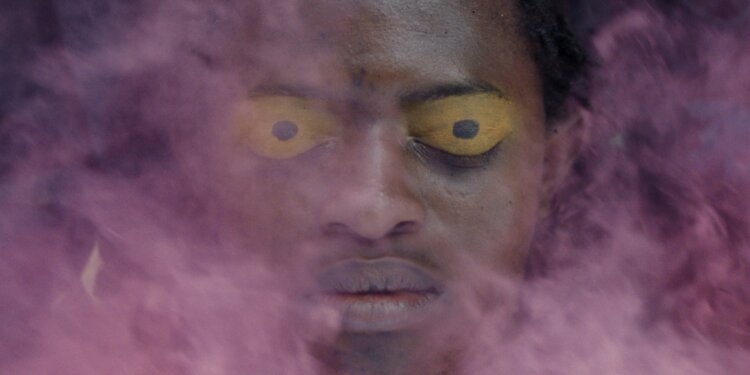Omen (Augure) opens with a masked rider trotting against the sandy dunes of a desert before alighting from his horse and diluting a blackened oasis with milk straight from their teat. Neither the striking image of the desert, the rider, nor the cloud of the begrimed contorting of milk and water is repeated nor mentioned ever again in the film. But they serve as a perfect introduction to the subversive and labyrinthine collection of characters, themes, and ideas layered in the ninety-minute film. Though submitted as Belgium’s entry for the 2024 Oscars, the film by Belgian-Congolese rapper and filmmaker Baloji is entirely African, contriving a mythical fable in the spirit of African folklore while producing a universal film that seeks to question the very ideals from which our spirituality is derived.
Omen’s protagonist, Koffi (Marc Zinga), returns home with a pregnant white fiancée, Alice (Lucy Debay), to pay his customary dowry to a family from whom he is an outcast, deemed cursed due to an unfortunate birthmark. Through the inviolate eyes of his fiancée, the film probes into Koffi’s family, who don’t hide their condemnatory spit for their eldest son, which quickly upsurges into a choral ritual of damnation that the fiancée can only be a spectator in. Omen, poignantly titled, is distinctively set on exhibiting the teeth and bite of African superstition and the toil it besets on those caught in its crosshairs, whether by accident or intention. These values and beliefs are so ingrained in the minds and hearts of the characters that they usurp the very familial bonds that should inherently be unbreakable. As Koffi and his fiancée tread through the rest of the film, the shadow of his seclusion follows him, only finding brief reprieve in the company of his sister, who also walked away, yet as the sister points out, his perdition is more gruesome because he can’t help but internalise it.
Underneath the main plot, Omen offers little nuggets of overlapping stories that, though they tie into the main one, are mostly afloat on their own rhythmic tones. The foreign influences of the film shine through with an African lens to them, giving us tastes of spaghetti western, Hansel and Gretel, and a humorous rap montage to pay homage to the Nestle breastmilk controversy and mermaids. And very much like in Neptune Frost, another beautiful surreal re-imagination of African lore, the stylised eruption of colourful visuals and poetic musical fusion heightens the senses. These filler moments are sometimes too decentralised from the main plot, and though they offer their own punch of curious mysticism, they take a lot away from the film’s core. However, scenes like women passively removing their lashes and make-up in casual conversation to then don funeral garments and descending into the pits of sorrowful mourning a moment later are so gratifying.
Sequenced during the Easter week, Omen crashes together native African rites over foreign ones, letting the two burst into a beautiful portrait of controlled chaos. Though the native customs are at times depicted as backwards and rigorously torturous, the progressive ones are not portrayed as the solution either. In this inauspicious melee, Omen thrives, where though a character might be on the run from her tradition that she claims wouldn’t accept her sexuality or choices, she finds comfort in a brief escape from the confusion that freedom gives her. What is most beautiful about Omen is that most of the juxtapositions are not laid out in dialogue or spirited conflict. For the most part, they permeate visually stunning scenes that cut through the need for exposition or even understanding, offering a surreal outlay strung onto a coherent foundation of ideas yet open enough for a perspective interpretation of what those ideas mean for every individual.
Omen is fearless and unequivocally unique. And even though its peculiar and enchanted scope doesn’t delve as deep as it could into African spirituality and the characters it tells the narrative through, for what it does manage to etch together, it delivers an innovative aesthetic visual spectacle and one of the most emotionally intense final fifteen minutes I have seen for an African film. Baloji’s directorial debut is laudable, and I cannot wait for more films from him.
Omen is now showing at Unseen Cinema.
Enjoyed this article?
To receive the latest updates from Sinema Focus directly to your inbox, subscribe now.











